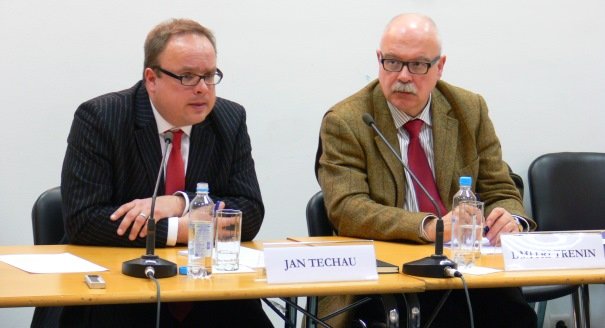{
"authors": [
"Dmitri Trenin",
"Jan Techau"
],
"type": "event",
"centerAffiliationAll": "",
"centers": [
"Carnegie Endowment for International Peace",
"Carnegie Russia Eurasia Center"
],
"collections": [],
"englishNewsletterAll": "",
"nonEnglishNewsletterAll": "",
"primaryCenter": "Carnegie Endowment for International Peace",
"programAffiliation": "",
"programs": [],
"projects": [],
"regions": [
"Western Europe",
"Germany"
],
"topics": [
"Political Reform",
"Economy"
]
}
Germany’s Changing Role in a Changing Europe
Wed, March 27th, 2013
Moscow
The latest developments connected to the financial crisis in the EU have only further underlined the need for a leader within the European community. This role has to be played by a crucial state with a real interest in an economically and politically strong EU. Many believe that Germany is the one who should take up this mantle. To do so, however, Germans have to come to terms with their difficult history. Jan Techau, director of Carnegie Europe, spoke about this during a presentation at the Carnegie Moscow Center. Carnegie Moscow Center’s Dmitri Trenin moderated.
Historical Foundations of Germany’s Current Foreign Policy Culture
- Historic Multilateralism: To come to terms with itself after the Third Reich and re-establish itself as a sovereign state, Germany created a strategic posture of restraint, passivity, and multilateralism in its foreign policy, Techau explained. The 1950s acceptance of Germany into NATO, as well as the creation of European Coal and Steel Community and the European Economic Community, underlined the post-war tendency of Germany to think as a team player reluctant to lead. This has had an impact on the country’s foreign policy decisions until the current day.
- Importance of Business in the Political Culture: Business was the field in which postwar Germany built its reputation and engaged in actively, Techau said. Due to the rapid reconstruction during Germany’s Wirtschaftswunder, its companies became vivid exporters just shortly after 1945. Thus, German reputation abroad was not built through its diplomatic actions but through its business activities. This gave business leaders a role in the state’s foreign policymaking. According to Techau, there is no other Western country in which the influence of business lobbies on deciding foreign policy is as strong as in Germany.
Demand for a Change in Foreign Policy in Germany
- After 1990: Although the demand for a changed, more active foreign policy came after the German unification, Techau explained that those changes did not take place until recently.
- Current Passivity in NATO and the EU: Currently, Germany is asked by other countries to spend more in terms of money and intellectual potential on the foreign policy of the EU as a whole and NATO, Techau continued. Nevertheless, it is reluctant to do so and stays passive.
- Eurozone Leadership: Nevertheless, Germany became a strong leader when it comes to the eurozone fiscal crisis, Techau said. Berlin did not adopt this role voluntarily, but it grew into the role because of its major economic and political stake in a unified Europe and a strong euro. German leaders assumed that role after two years of the crisis, Techau added.
- Importance of the “German Trauma”: The German leadership in the financial crisis has not had any major spillover effect on the foreign policy of the EU. Germany’s reluctant behavior in the UN Security Council on the crisis in Libya is the main proof of that, Techau said. The reluctance to be a major player in foreign policy, especially in the military field, is still caused by what Techau called the “German trauma” of the Second World War.
The Current Situation of German Foreign Policy
- A Leader for Smaller States: The dissonance between the demand for German leadership and Germany’s unassertive foreign policy is still strong, Techau said. Even though smaller states such as Austria, Denmark, Belgium, and Poland regularly await the German position on crucial issues, with the goal of building their own strategy around Berlin’s view, Germany is reluctant to assume the role it is asked to have.
- A Leader Without an Agenda: According to Techau, due to Germany’s economic and geographical position, it is leading Europe no matter what Berlin might intend. Nevertheless, Germany has not turned this leadership into any political agenda and has not given any indication of a desire to do so. This leads foreign partners to begin to perceive Germany as unreliable and difficult to read, added Techau.
- Historic Forgiveness Is the Key: For Germany to fulfill the demand for a strong EU leader, it firstly has to forgive itself for its history and directly state its national interests, Techau concluded. Without taking these steps, it cannot take on the role that many want it to play and which Europe may need it to play.
Carnegie does not take institutional positions on public policy issues; the views represented herein are those of the author(s) and do not necessarily reflect the views of Carnegie, its staff, or its trustees.
Event Speakers
Dmitri Trenin
Former Director, Carnegie Moscow Center
Trenin was director of the Carnegie Moscow Center from 2008 to early 2022.
